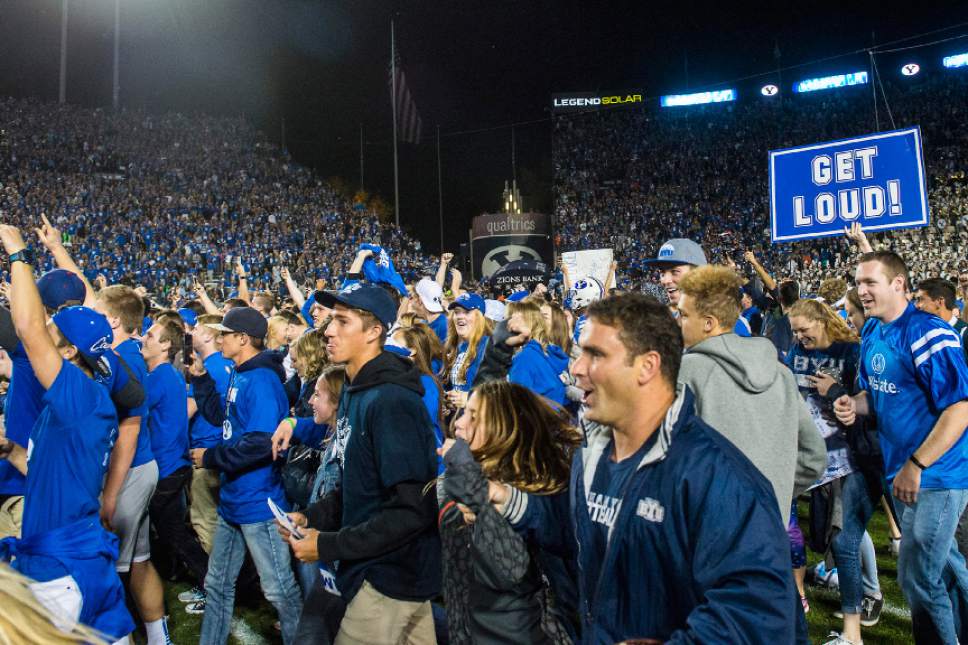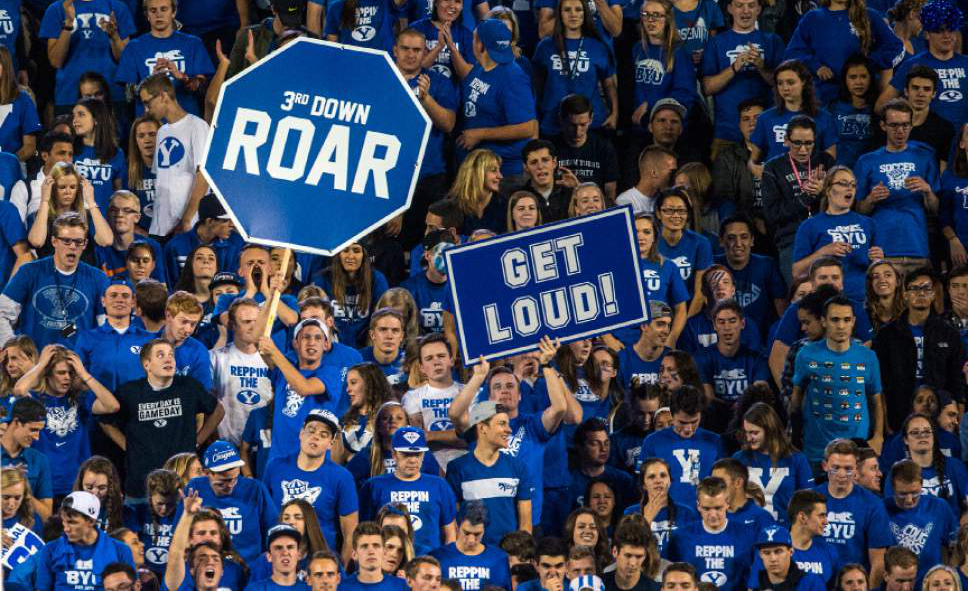This is an archived article that was published on sltrib.com in 2016, and information in the article may be outdated. It is provided only for personal research purposes and may not be reprinted.
Provo • It was in the spring of 2014 when then-BYU football coach Bronco Mendenhall began to warn fans and media members that it would be difficult for the Cougars to maintain their level of play in football if they were not invited to a major conference.
"Independence is not sustainable," Mendenhall famously uttered, and months later BYU athletic director Tom Holmoe acknowledged his coach's comments were on target, even though Mendenhall's pleading to the Big 12 Conference for admission back then — via an interview with the Austin American-Statesman — caught school administrators a bit off guard.
Asked last January whether his and Mendenhall's comments regarding independence still applied, Holmoe replied, "I think that's probably still true. I mean, if you are looking at [it] long term …. there is a divide in the resources."
One of those "resource" conferences — the Big 12 — announced last Monday that it will not expand, crushing the hopes of BYU, Houston, Cincinnati and others. The Cougars are still on the outside looking in, despite having one of the top overall athletic programs in the West, if not the country. BYU has never finished lower than 48th nationally overall in the Learfield Sports Directors Cup standings and was 27th in the 2015-16 school year, ahead of every Big 12 school except No. 9 Texas, No. 14 Oklahoma and No. 18 Oklahoma State.
So, what's next for BYU?
Holmoe declined an interview request for this story, saying through an athletic department spokesperson that he's received too many requests to fairly accommodate all of them, and will speak publicly in the near future.
BYU's statement after Monday's announcement provided some clues as to what it is thinking, but not much. The Cougars said going through the Big 12 process reminded them "how strong we are as a university" and that "BYU strives to run its athletic program like a P5 institution." Touting its national fan base, broadcast ratings and "historical and recent successes" of its teams, BYU concluded: "We certainly belong."
That certainly doesn't sound like a school that will be content to drop its P5 dreams and slink back to a Group of 6 conference such as the Mountain West, or American Athletic Conference, as some are calling for it to do.
Barring something unforeseen, or a change of heart by the Big 12 (three of the 10 presidents are on their way out, or interims) the next round of realignment/expansion probably won't come until Power 5 conference television contracts expire in 2025.
Basically, BYU has three options: 1) Maintain its status as a football independent and keep most of its other sports in the West Coast Conference. 2) Rejoin the MWC or join the AAC or, 3) Abolish its intercollegiate athletics program as was done at BYU-Idaho years ago and will be done at BYU-Hawaii next spring.
There are probably other routes, like working with other Big 12 expansion candidates to form a new conference, but that's as far-fetched as the school giving up on a nationally prominent athletic program. And a new league with BYU/Houston/Cincy as its marquee schools isn't going to get anything close to P5 television money.
It has generally been assumed that the Mountain West would welcome BYU back, but that notion isn't a slam dunk. When BYU left the MWC after the 2010-11 school year, several schools decided they would not schedule BYU anymore, and most still haven't six years later.
There's also the issue of BYU's Honor Code forbidding homosexual behavior among its students and staff, an issue that reportedly caused the school to become "toxic" or "radioactive" to some Big 12 presidents. Who's to say that won't happen again if BYU engages in discussions to join another league?
Clearly, BYU fans want the school to remain independent and keep chasing P5 membership, a recent survey found.
A mid-September Dan Jones & Associates statewide survey, commissioned by The Salt Lake Tribune and the Hinckley Institute of Politics, showed that a majority of Utahns — and an even higher majority of BYU fans — believe the Cougars should stay independent in football. Forty-three percent of the 820 Utahns who responded to the survey said BYU should maintain the status quo. That is compared to 27 percent who said it should rejoin the MWC and 9 percent who said it should abolish its intercollegiate sports program. Twenty-one percent suggested another course of action, did not answer the question, or didn't know.
Among those who describe themselves as "very active" LDS church members, 53 percent favor the status quo. Forty-four percent of inactive LDS say BYU should return to the MWC. Only 6 percent of all LDS respondents said the entire athletic program should be eliminated.
Twitter: @drewjay —
What should BYU do next?
How 820 Utahns responded in a recent Salt Lake Tribune poll:
43 percent • Maintain status quo as a football independent and member of the WCC
27 percent • Rejoin the Mountain West Conference
18 percent • Preferred not to answer or didn't know
9 percent • Abolish its intercollegiate athletics program
3 percent • Do something not listed above
Source: Dan Jones & Associates poll for The Salt Lake Tribune and the Hinckley Institute of Politics, Sept. 12-19, margin of error plus or minus 3.4 percentage points





